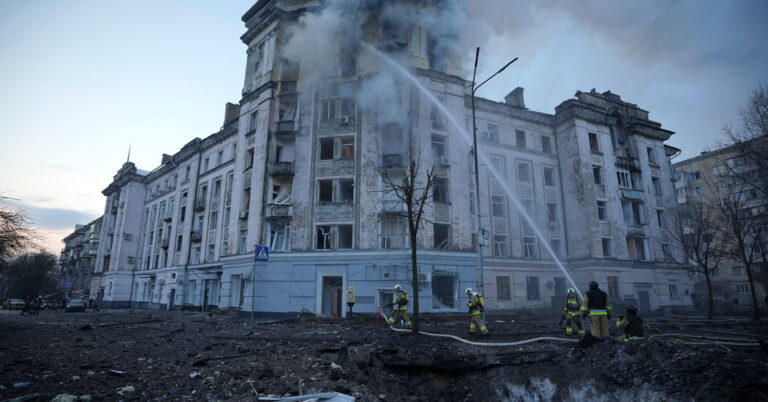Russian missiles streaked into Kyiv early Thursday in the biggest assault on the Ukrainian capital in weeks, injuring at least 13 people and damaging several residential buildings and industrial facilities, according to local officials.
The Ukrainian Air Force said that air defense systems had intercepted all 31 of the Russian missiles that targeted Kyiv. Still, debris from the downed missiles fell in various parts of the city, causing the injuries and damage. No deaths have been reported so far.
“Such terror continues every day and night,” President Volodymyr Zelensky of Ukraine said in a social media post that included a video of firefighters dousing burning buildings with water.
The attack began in the early morning with loud blasts jolting residents awake around 5 a.m. as air defense systems went into action. Many people rushed to take shelter in subway stations. Several orange fireballs lit up the sky, apparently the result of missile interceptions.
Air-raid alerts ended at 6:10 a.m. just as sun rose, revealing the damage.
Vitali Klitschko, Kyiv’s mayor, said on Telegram that missile debris had caused fires in at least three residential buildings and in parking lots. He said emergency responders had been deployed to help victims. Four people were hospitalized, the city’s military administration said.
Photos of the aftermath of the attack released by Oleksiy Kuleba, the deputy head of Ukraine’s presidential office, and the local authorities showed burned-out cars in front of a building with a facade blackened by fire, a large hole at the foot of a pink building with all of its windows shattered, and a destroyed house on charred ground.
In the Podilskyi district, which is home to industrial facilities that Russia has targeted in the past, a plume of black smoke was rising early in the morning, suggesting a hit. Mr. Klitschko said a fire had broken out at a power substation in the area.
In the past, the targets of Russian air assaults have sometimes been unclear, and Ukrainian officials rarely confirm strikes on strategic industrial and military targets.
On Thursday, however, an official from Ukraine’s military intelligence services said most of the missiles had targeted the agency’s offices in the capital, but had been shot down before reaching their destination. The official spoke on condition of anonymity to discuss sensitive matters, and his claim could not be independently verified.
The assault Thursday came at a difficult time for Ukraine’s military, with Russian forces pressing ahead with ground attacks at several locations along the front line of more than 600 miles.
Faced with a shortfall of troops and ammunition, Ukraine has struggled to contain Russian assaults in its east and south. Ukrainian officials have vowed to launch a counteroffensive this year, but experts say the military has yet to receive the kinds of weapons that would let it regain the initiative on the battlefield, with American aid held up in Congress.
On Wednesday, Jake Sullivan, President Biden’s national security adviser, made an unannounced trip to Kyiv in an effort to show the White House’s continued commitment to Ukraine’s defense. He urged Republican lawmakers to pass the stalled package of billions of dollars in aid.
“It has already taken too long,” Mr. Sullivan told reporters in a briefing at Ukraine’s presidential office. “And I know that — you know that.”
Thursday’s attack on Kyiv echoed a strategy used by Russia during air assaults in late December that consisted of overwhelming Ukraine’s air defenses with multiple launches of various types of missiles, including ballistic and hypersonic ones.
Russia has launched relatively few large-scale missile attacks in recent months, despite a capacity to produce more than 115 long-range missiles per month, according to Ukrainian officials.
Mr. Zelensky said on Thursday that Ukraine urgently needed more air defense systems from Western allies. He pointed to recent missile attacks on the cities of Kharkiv, Odesa and Kherson that claimed many lives.
“We need the support of our partners,” Mr. Zelensky said. “We must prove that terror is always the loser.”
Oleksandra Mykolyshyn and Maria Varenikova contributed reporting.

